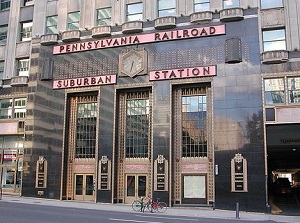2018 School Spending Survey Report
Philly Free Library Debuts Virtual Collection at Suburban Station
The Free Library of Philadelphia will launch what it calls the first virtual library at a U.S. train station on April 2. Throughout National Library Month (April), commuters will be able to download books, music, and podcasts by scanning QR codes placed on 76 advertising boards on Philly’s Suburban Station platforms.

One of the QR codes from the Philadelphia Free Library's Virtual Library
The Free Library of Philadelphia will launch what it calls the first virtual library at a U.S. train station on April 2. Throughout National Library Month (April), commuters will be able to download books, music, and podcasts by scanning QR codes placed on 76 advertising boards on Philly’s Suburban Station platforms. The virtual library will offer 15 classics, 13 bestsellers or “current” titles, and 22 author podcasts, Alix Gerz, Director of Communications and Brand Marketing for the Free Library of Philadelphia Foundation, told LJ. The podcasts and classics are open access, but the bestsellers through Overdrive require a library card. (The access policy for this campaign is the same as it is for accessing the library’s full digital offerings via the website, which include more than 80,000 ebooks, 8,000 audiobooks and 1,000 author podcasts.) Free Library staff members “have already begun checking the holds on the featured titles so that they are ready for next week’s launch,” Gerz said, “with plans to obtain additional copies as needed, in keeping with their usual holds ratio (of 5 holds per copy). [they] have allocated funds specifically to support this promotion and its expected increase in usage.” Books will expire as they typically do through the library’s e-lending services. Podcasts are streaming and can be “listened to as much as the user wants,” said Gerz. Siobhan A. Reardon, President and Director of the Free Library, and Kim Scott Heinle, SEPTA Assistant General Manager for Customer Service, will kick off the promotion at an event on April 2 at 11 a.m., while the Philly Free Library’s Digital Resource Specialists will help travelers learn to access the content.
Pennsylvania Railroad Suburban Station by
http://www.flickr.com/photos/electrospray/20042432/
Attribution-NonCommercial-NoDerivs License
RELATED
RECOMMENDED
TECHNOLOGY
ALREADY A SUBSCRIBER? LOG IN
We are currently offering this content for free. Sign up now to activate your personal profile, where you can save articles for future viewing









Add Comment :-
Comment Policy:
Comment should not be empty !!!
CopyCat
find the "original" idea here: https://vimeo.com/58161297Posted : Apr 03, 2013 04:41
CopyCat
So the Philly Free Library basically copied the Miami Ad School students idea of the "Underground Library"? Sounds like a cheap version of this idea to me...Posted : Apr 03, 2013 04:38